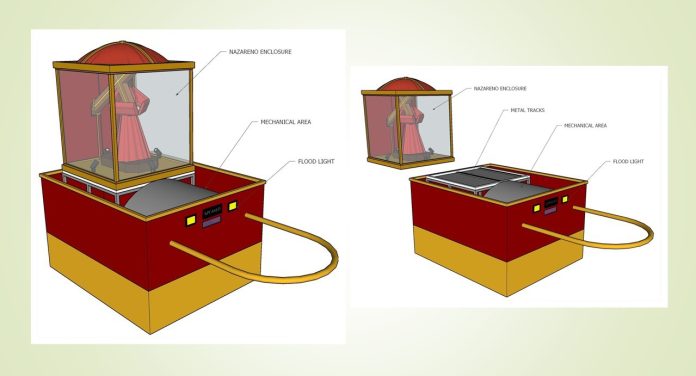As the traditional procession of the Black Nazarene returns for the first time in three years in Manila, church authorities are implementing measures to keep the solemnity of one of the nation’s biggest religious festivals.
It’s not really something new, said Quiapo Church rector Fr. Jun Sescon “but rather a return to the old ways of expressing our devotion.”
“After what we’ve been through, the pandemic, this is the time for a reset,” Sescon said during a press conference on Thursday.
“And our prayer is that, with these learnings, may we celebrate it in an orderly, safe, and sacred manner,” he said.
One of the notable measures being implemented for the Jan. 9 “Traslacion” or procession from the Quirino Grandstand to Quiapo Church is the new design of “andas” or carriage of the life-sized Black Nazarene statue— now encased in “laminated tempered glass”.
The parish church earlier announced that climbing onto the carriage is prohibited to ensure the safety of the devotees.
Among the devotees, kissing the cross and touching the image are seen as ultimate goals, believed to bring miracles.
“The measures we’re implementing now for a solemn and orderly procession have long been desired by parish priests before me and the former mayors and police directors,” Sescon said.
As COVID-19 has not totally lost its bases around the country, organizers also encouraged the devotees to keep their face masks on even in outdoor venues.
In Quiapo, the parish has decided to maintain a one-meter physical distance among the devotees both inside and outside the church during Masses.
“We’ll do our best… but we are also willing to adjust if the situation calls for it,” the rector added.
Activities at the Quirino Grandstand will start on Jan. 6, and devotees will be allowed to touch the image after the 6 pm Mass.
Cardinal Jose Advincula of Manila will preside over the midnight Mass on Jan. 9, also at the grandstand. The vigil will continue until the procession starts around 6 a.m.
Over at the Quiapo Church, Masses will be held every hour from 3 p.m. on Jan. 8 to 11 p.m. on Jan. 9.
This year’s procession will also follow a shorter route, similar to the one used in 2020.
Mayor Honey Lacuna of Manila said around 12,000 cops will be deployed to secure the activities of the feast.
Upon the mayor’s request, President Ferdinand Marcos Jr has declared Jan. 9 as a special non-working day in Manila to give way for the Black Nazarene feast.
The city will also enforce a ban on firearms, liquor, and firecrackers for the security of Traslacion.
Sailing will be prohibited in nearby Manila Bay and along the Pasig River, where Coast Guard personnel will monitor the bridges that devotees will pass through.
Organizers also announced the presence of “field hospitals” along the procession routes, in addition to first aid stations and rescue teams stationed in designated areas.









